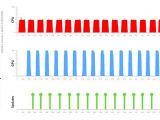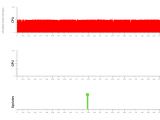Some of the most recent releases of Firefox and Chrome are no match for Internet Explorer 9 when it comes down to the performance delivered because of hardware acceleration capabilities. Back in June 2010, Microsoft threw Internet Explorer 9 Platform Preview 2 in the hardware acceleration arena against a set of rival browsers, and the next generation of IE wiped the floor with products traditionally perceived by the public as delivering superior speed. It’s now the turn of IE9 Platform Preview 3 Build 1.9.7.8.74.6000 to leave browsers like Firefox 4.0 pre-Beta 1 and Chrome 5.0 Stable in the dust.
While for the first set of hardware acceleration tests, Microsoft used the Flickr Explorer sample on the IE Test Center website, for the latest browser measuring content, the company leveraged the Amazon Shelf concept application which was released concomitantly with the third IE9 Platform Preview.
“Much like Flickr Explorer, Amazon Shelf is written using standard HTML, CSS and Javascript. Amazon Shelf also incorporates a key new HTML5 feature – the canvas element. Canvas is an incredibly powerful way to draw directly to the screen using simple Javascript API calls,” explained Seth McLaughlin, Program Manager for IE Performance. “When you launch Amazon Shelf, you’re shown a list of the top selling books from Amazon. This data is retrieved using the Amazon Product Advertising API. You can search for specific books, browse, and “open” books to view detailed information and customer reviews.”
Microsoft only introduced support for Canvas with the delivery of IE9 Preview 3 at the end of the past month, when it expanded its focus on HTML5. But as is the case of additional HTML5 elements, such as video, and all graphics in IE9, Canvas is also is fully hardware accelerated. This is of course available in the default configuration of Internet Explorer 9, and it results in amazing performance gains.
“When IE9 users browse to a website that uses canvas, IE will automatically leverage the full capabilities of the PC to provide a great experience with levels of performance not possible with today’s browsers. Using IE9, Amazon Shelf is generally able to maintain a responsiveness of 60 frames per second, which is considered realtime. Today’s browsers are only able to achieve framerates of 1-8fps which is a small fraction of the performance provided by IE9,” McLaughlin added.
Hardware acceleration might not resonate all that much with end users, but the fact of the matter is that although the vast majority of customers won’t understand the actual technology, they will be able to enjoy immersive and rich Cloud-based applications functioning as if they would be installed locally.
IE9 will take full advantage of the computer’s GPU in concert with the DirectX 11 collection of APIs, and deliver smooth experiences like users can see with the Amazon Shelf at a frame rate of 60 FPS. At this point in time, rival browsers, including Chrome and Firefox are incapable of delivering hardware accelerated experiences to match IE9.
“Chrome is able to update the screen once every 0.99 seconds, yielding a frame rate of about 1 FPS during the bookshelf load animation. This results in a very slow, choppy experience. One core on this dual core machine is fully utilized, and the GPU is not employed by the browser at all,” McLaughlin said. We used Minefield 4.0b2pre nightly (Firefox 4 Beta) for [the] analysis. Again, our tests ran this latest nightly build of Firefox (like all the others) in the default configuration. This means hardware rendering with the GPU was not enabled in Firefox. The animation is rendered properly, and the screen is updated twice every .25 seconds, yielding a frame rate of about 8 FPS,” he noted.
Internet Explorer 9 (IE9) Platform Preview 3 is available for download here.
Google Chrome 5.0 Stable is available for download here.
Firefox 4.0 Beta is available for download here.
Follow me on Twitter @MariusOiaga.

 14 DAY TRIAL //
14 DAY TRIAL // 


